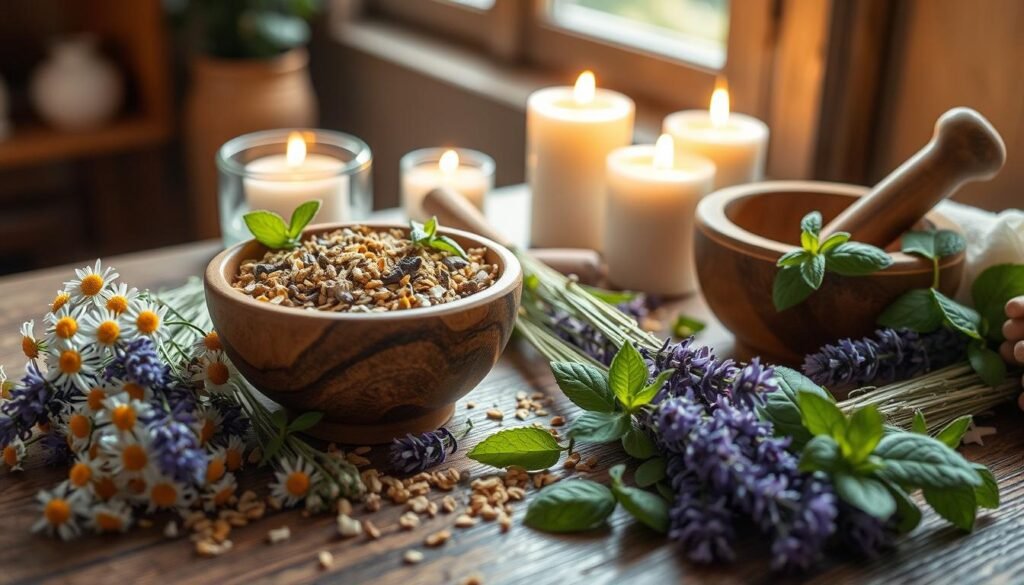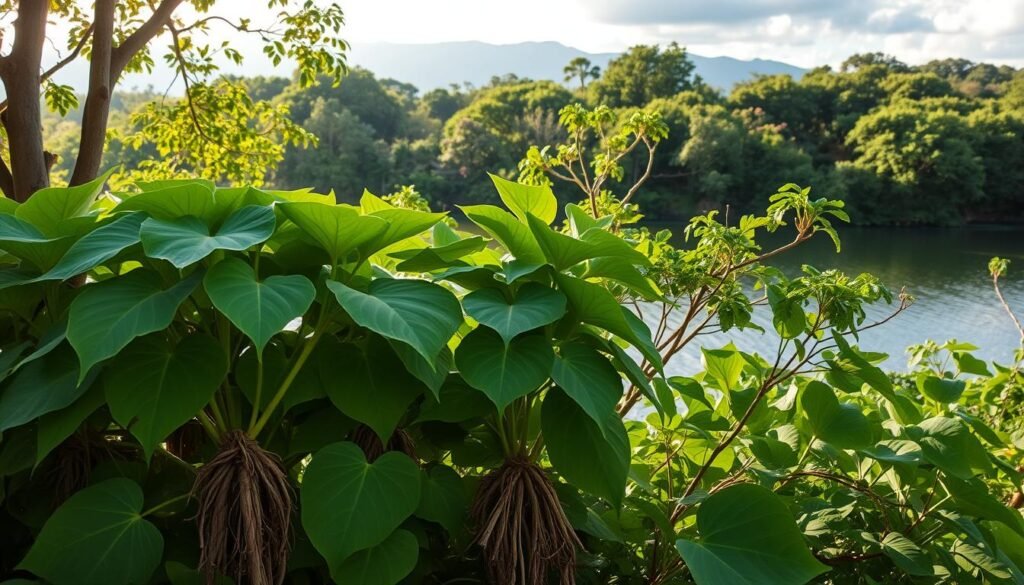About 40 million adults in the U.S. face anxiety disorders yearly. This fact underlines the urgent need for effective anxiety management methods. Many are moving away from traditional drugs due to side effects. Instead, they’re choosing natural remedies, like the finest herbs for easing anxiety.
Herbal solutions for stress are making a big difference. They offer new ways to relax and feel better emotionally. Herbs such as chamomile and valerian root are known for their healing effects. Studies support their role in reducing anxiety. Adding these herbs to daily life helps people achieve peace and handle life’s ups and downs better. Find out how natural supplements can help with anxiety relief here.
Key Takeaways
- 40 million adults in the U.S. experience anxiety disorders annually.
- Natural remedies for anxiety can provide effective alternatives to prescription medications.
- Herbal supplements for stress, such as chamomile and valerian root, have been researched for their calming effects.
- Incorporating the best herbs for anxiety can promote relaxation and emotional well-being.
- Research shows a reduction in side effects when herbal medicines are used alongside traditional treatments.
Understanding Anxiety and Its Impact
Anxiety is our body’s way of reacting to stress. It greatly affects how we go about our everyday lives. Disorders like generalized anxiety, panic disorder, and phobias can really mess up our work, home life, and friendships. Many folks deal with symptoms that make normal life quite hard.
Anxiety’s causes are complex, often tied to long-term stress or tough childhoods. A shocking 65% of adults have had hard times as kids, which may lead to anxiety disorders later. This condition can stress our nervous, heart, and immune systems, showing why managing it is crucial.
Besides usual treatments, certain herbs like Ashwagandha and Holy Basil might help ease anxiety. Exercise also helps, though scientists are still figuring out how it links to mental health. Techniques like meditation and using weighted blankets bring relaxation and emotional relief.
Herbs like chamomile and Skullcap are key in fighting anxiety by helping us feel calm and at ease. If anxiety symptoms last over six months or mess with day-to-day life, seeing a doctor is key. Getting the right help is important for healing.
Signs and Symptoms of Anxiety Disorders
Anxiety disorders change lives in many ways. One common sign is worrying too much. This can take over daily life and cause a lot of restlessness. People often feel very tired, even if they sleep well. It can be hard to focus or have conversations. Many also have trouble sleeping, like not being able to fall asleep. This makes anxiety and tiredness worse.
It’s important to notice these signs early. Knowing them soon can stop anxiety disorders from getting worse. It helps people start treatments that work better. Some people look into herbal supplements for stress. They think these might help along with other treatments.
Around 18% of Americans face anxiety disorders every year. Genes and where you live can affect this. Knowing this helps us act early to manage it better.
Look at these common symptoms of anxiety disorders:
- Excessive and uncontrollable worry
- Restlessness and agitation
- Fatigue or exhaustion
- Difficulties with concentration
- Sleep disturbances, such as insomnia

Studies often find that herbal supplements for stress are helpful. They are checking which herbs might work best. Knowing and dealing with anxiety symptoms is key. This way, people can get the right treatment. They can also see if herbal remedies help alongside other treatments.
| Symptom | Description |
|---|---|
| Excessive Worry | Persistent and uncontrollable thoughts about multiple situations |
| Restlessness | A feeling of unease or being unable to relax |
| Fatigue | Constant tiredness not resolved by rest |
| Difficulties with Concentration | Inability to focus on tasks or conversations |
| Sleep Disturbances | Issues such as insomnia that hinder effective rest |
The Role of Natural Remedies in Managing Anxiety
People are turning to natural remedies for anxiety as they look for safer options than drugs. These remedies focus on managing anxiety symptoms with herbs and lifestyle changes. Many prefer herbs because they believe these have fewer side effects than traditional drugs.
Ashwagandha, chamomile, and lavender are popular for anxiety relief. In 2019, a study found 600 mg of ashwagandha reduced stress significantly. Also, a 2016 trial showed that chamomile helped maintain calm in users over 12 weeks.
Lavender is known for its calming effects, thanks to linalool and linalyl acetate. A 2017 review highlighted how these compounds might help with anxiety short-term.

Despite their benefits, it’s essential to use natural remedies wisely. They can interact with other medications, posing risks for some people. Always talk to a healthcare provider before starting any herbal treatment.
Using natural remedies as part of your anxiety treatment can be very helpful. Along with herbs, adding lifestyle changes improves results. Activities like yoga and mindful meditation have been proven to help with anxiety symptoms.
| Herb | Dosage | Study Findings |
|---|---|---|
| Ashwagandha | 600 mg/day | Significant reduction in stress levels in a study of 58 participants. |
| Chamomile | 1,500 mg/day | No relapse of generalized anxiety disorder symptoms over 12 weeks. |
| Lavender | Essential oil | Calming effect on brain receptors observed in a 2017 review. |
In summary, natural remedies offer a promising way to manage anxiety. However, personalized care is crucial. If you’re dealing with anxiety, consult a healthcare professional for a balanced and effective management plan.
Best Herbs for Anxiety
For ages, people have turned to herbs to calm anxiety. Knowing which herbs work best can show us a natural way to feel better. Many choose these herbs over man-made medicines. We’ll look into top choices and their background here.
Overview of Effective Herbs
A few herbs really help with anxiety. Here are the stars:
- Ashwagandha: This herb adjusts to stress, cutting anxiety and bettering stress hormone levels.
- Valerian Root: It’s all about relaxation and sleep, thanks to its anxiety-fighting talents.
- Kava: Known for calming vibes, its kavalactones beat the usual drug side effects.
- Chamomile: Drinking this tea smooths out stress and lifts your spirits.
- Lemon Balm: It’s been calming nerves for ages, easing anxiety and boosting happiness.
Traditional Use of Herbs in Anxiety Treatment
All over the globe, herbs have been the go-to for reducing anxiety for centuries. Lavender, for instance, rivals strong medications in easing the mind without the negatives. And turmeric, boasting curcumin, fights inflammation and fosters mental health.
Then there’s reishi, famed for making the body’s stress response better. These herbs don’t just calm; they bring a long history of healing into today’s wellness methods.
Kava: Benefits and Risks
Kava is becoming popular for stress relief. Many people use it to calm anxiety. It has a rich history in South Pacific cultures for bringing peace and calm. But it’s important to look at both its possible benefits and risks.
Short-Term Benefits of Kava
Some stories and early studies say kava can quickly reduce anxiety. Studies have found it might work as well as some anxiety medicines. One review showed kava extract was better than a placebo in managing anxiety.
People taking 20 to 300 mg of kavalactones daily noticed less anxiety. At about 300 mg, kava also seemed to lift mood and improve thinking skills.
Potential Liver Damage Concerns
However, kava might harm the liver. Over 30 liver damage cases were reported in Europe. The U.S. and Europe saw at least 25 liver injury cases. Problems included hepatitis, cirrhosis, and liver failure.
In 2002, the FDA warned about the risk of liver damage from kava. Some countries have since limited its use. Anyone considering kava should talk to a doctor first. High doses over a long time can cause skin and hair issues. Safe preparation of kava could lower these risks.

| Aspect | Details |
|---|---|
| Potential Benefits | Short-term anxiety relief, mood enhancement |
| Recommended Dosage | 20 to 300 mg of kavalactones daily |
| Risks | Liver damage, skin issues, and possible interactions with medications |
| FDA Warnings | 2002 warning about risks associated with kava |
| Reported Cases | 30+ liver damage cases in Europe, 25+ in US |
Passion Flower: A Natural Calming Agent
Passion flower is gaining attention as a go-to herbal remedy for emotional health. It’s known for its power to ease anxiety. Many studies confirm its ability to lower anxiety safely.
Clinical Evidence Supporting Its Use
Clinical research highlights the benefits of Passiflora incarnata, or passion flower, for anxiety relief. A review of nine trials found that it helped most users feel less anxious. Compared to certain anti-anxiety drugs, its results were impressive.
It’s been used to reduce anxiety in situations like surgery and withdrawing from drugs. This shows its value in managing anxiety.
Safety Considerations and Side Effects
Though safe for most, caution is advised with passion flower. Mixing it with alcohol or sedatives can increase drowsiness. It’s not recommended for pregnant or breastfeeding women due to possible risks.
Some might feel sleepy or dizzy. Yet, no serious side effects were seen in studies. For best results, opt for extracts with at least 0.8% flavonoids or isovitexin.
| Study Type | Findings | Duration |
|---|---|---|
| Systematic Review | Reduction in anxiety levels | Varied (1 to 30 days) |
| Controlled Trials | Efficacy comparable to oxazepam | Varied |
| Animal Studies | Anticonvulsant and reduced stress | Long-term |
For more insight into passion flower’s effect, check out clinical studies on its benefits.
Valerian Root: A Sleep Aid with Anxiolytic Properties
Valerian root has been known since the Middle Ages for its help with sleep problems like insomnia. This herb has many parts, such as valepotriates, flavonoids, and a bit of gamma-aminobutyric acid (GABA). These parts help calm the mind. It’s a top herb for easing anxiety, thanks to its impact on GABA receptors in our brain. This makes us relax and feel less stressed.
How Valerian Works on Anxiety
Studies show valerian root can make anxiety symptoms better and improve sleep. It might help with obsessive-compulsive disorder (OCD) and kids’ hyperactivity, too. In adults, it can lessen menopause hot flashes and ease premenstrual syndrome (PMS) signs. People using valerian root tend to fall asleep quicker and have better sleep, without the groggy feeling some sleep aids cause.
Still, how well valerian helps with anxiety is up for debate. Studies don’t always agree, mostly because of small group sizes and many folks dropping out. A big review of valerian studies noted issues with the stats and finding out valerian’s true effect. So, talking to a doctor is key, especially for those who are pregnant, breastfeeding, or using other medicines.
The suggested dose of valerian is 400-900 mg at bedtime, but this can change based on the product type. Be aware of possible side effects like headaches and dizziness. They might not always be from valerian but should be watched. With the right guidance and doctor’s advice, valerian root can be a major part of managing anxiety and improving mental health.
For details on valerian root’s history and research, check out Mount Sinai’s resource. Also, learning different ways to manage stress can help your mental health. This stress management guide has practical tips.
Chamomile: The Soothing Floral Remedy
Chamomile is a part of the Asteraceae family. It’s known as a herbal remedy for emotional well-being. It helps with sleep and reduces anxiety. You can find chamomile in herbal tea, capsules, and extracts. It is loved for its ability to calm the mind.
Studies show chamomile can greatly lower anxiety. It’s one of the top herbs for relaxation and stress relief. Research involving 844 people confirmed its effectiveness. Different amounts were tested, like 1,500 mg daily. Chamomile was found to ease anxiety and helps with things like menstrual pain.
Chamomile is safe for most, but some might have allergic reactions. This is especially true for those allergic to daisy family plants. Be careful if you use blood thinners or sedatives. Consult a doctor if you’re pregnant, nursing, or have surgery soon.
| Form of Chamomile | Typical Dosage | Common Uses |
|---|---|---|
| Herbal Tea | 2 cups daily | Relaxation, sleep aid |
| Capsules | 250-1,200 mg per day | Anxiety relief, digestive issues |
| Liquid Extracts | Varied | General wellness, inflammation |
| Essential Oil | Aromatherapy | Stress reduction, skin conditions |
For those looking for natural anxiety treatments, chamomile is a great choice. It has moved from old traditions to modern use. With anxiety disorders on the rise, chamomile and other herbal remedies for emotional well-being could help a lot of people.
Conclusion: Integrating Herbs into Anxiety Management
Many people are looking for effective ways to ease anxiety. They are turning to herbs like kava, passionflower, and chamomile. These herbs have shown promise in supporting mental health.
Before adding herbal supplements to your routine, talking to a doctor is crucial. Often, people don’t tell their doctors about the herbs they use. This can cause problems with other medicines they’re taking. Understanding herbs and their effects is key to safe use.
Using natural remedies along with therapy and healthy lifestyle changes can help manage anxiety. It’s important to look at all options, including herbs. This ensures a safe and well-rounded approach to dealing with anxiety.